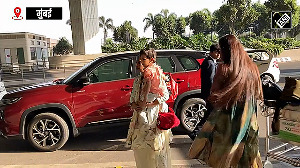Indian Ambassador to the US Ronen Sen on Tuesday declared that India was fully committed to meeting its obligations under the historic Indo-US civil nuclear accord signed on July 18, 2005, and was confident that Washington would keep its part of the deal.
"Both sides are in the process of implementing various reciprocal arrangements under the agreement," Sen said at the "Newsmakers" programme at the National Press Club here, days ahead of US President George Bush's three-day state visit to India beginning March 1.
Complete coverage: The Indo-US nuclear tango
The Ambassador faced a volley of questions from the floor after his introductory remarks, most of them relating to the civil nuclear deal that was part of the landmark India-US Joint Statement issued after Prime Minister Manmohan Singh's summit meeting with US President George Bush on July 18 last year.
In reply to a question on India's vote against Iran at the International Atomic Energy Agency and suggestions that Delhi had been under pressure from Washington, Sen declared, "India cannot be a follower. But it can be a good, reliable strategic partner."
He said, under the deal, India was committed to the separation of its civil and military nuclear facilities and to concluding an agreement with the IAEA on a safeguards regime.
Likewise, President Bush was committed to persuading the US Congress to support the deal and to persuade the Nuclear Suppliers Group to lift restrictions against India.
"I can tell you with absolute certainty that the prime minister and the government of India remain committed to fulfilling its obligations under the agreement. We are equally confident about the US meeting its obligations," he said.
Complete coverage: Dr Singh in the US
Sen declined any comment on the on-going negotiations between the two sides to iron out differences in the implementation of the deal, except to say that US Under Secretary of State for Political Affairs Nicholas Burns will hold talks with Indian Foreign Secretary, Shyam Saran, in Delhi on Thursday and Friday on various issues.
He repeatedly said that the accord, which is primarily aimed at ensuring energy security for India, was in the interest of both India and the US as well as the world at large.
Talking about Indo-US relations reaching new heights in recent times, he said, "We are at a decisive moment in our relations."
Referring to the debate on the separation of India's civil and military nuclear facilities, the Ambassador said the sentiments expressed in various quarters would be kept in view.
He also made it clear that India remained committed to the fast breeder reactor programme and to the utilisation of its vast resources of thorium for much-needed energy. Sen also dwelt at length on India's non-proliferation record.
In reply to a question, Sen said India did not need any external assistance for its strategic programme. "We have developed the technology on our own, not obtained it through covert means or agreements with third countries. That programme will continue."
To another query about whether the relationship would turn sour and adversarial in the long run as had happened with Washington's ties with Beijing, the Ambassador said the chances of this happening were remote, given the many shared values, interests and concerns the two countries had.
Sen also spoke about the scourge of terrorism and said both India and the US were deeply conscious of the fact that it is a global problem which had to be tackled on a global basis.
He said both sides were keenly watching developments in India's immediate neighbourhood and beyond and were engaged in a constant dialogue and exchange of intelligence as part of the global fight against terrorism.
The Ambassador said a very warm welcome awaited President Bush and First Lady Laura Bush in Delhi and said the people of India recognised the role played by Bush in giving a new impetus to the bilateral relationship and taking it to new strategic heights.






 © 2025
© 2025